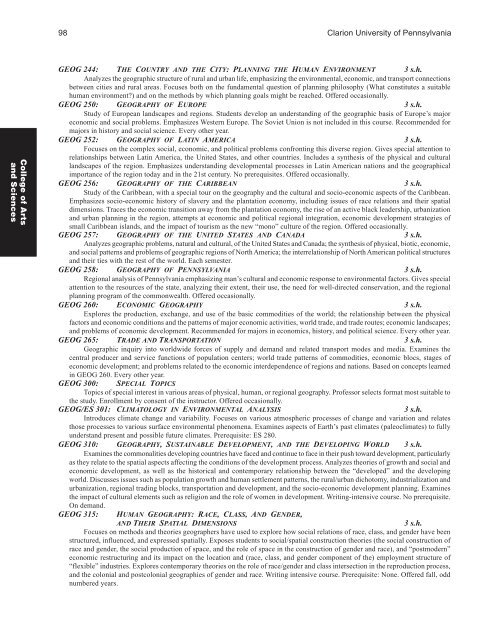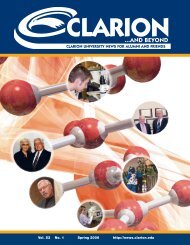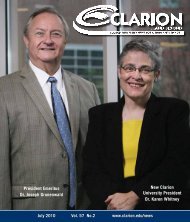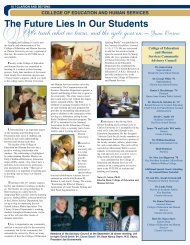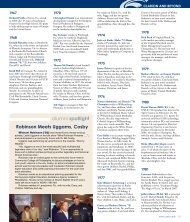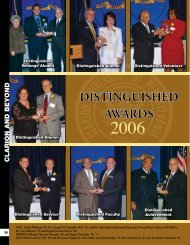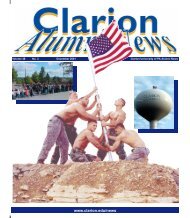Undergraduate - Clarion University
Undergraduate - Clarion University
Undergraduate - Clarion University
Create successful ePaper yourself
Turn your PDF publications into a flip-book with our unique Google optimized e-Paper software.
98 <strong>Clarion</strong> <strong>University</strong> of Pennsylvania<br />
College of Arts<br />
and Sciences<br />
GEOG 244: THE COUNTRY AND THE CITY: PLANNING THE HUMAN ENVIRONMENT 3 s.h.<br />
Analyzes the geographic structure of rural and urban life, emphasizing the environmental, economic, and transport connections<br />
between cities and rural areas. Focuses both on the fundamental question of planning philosophy (What constitutes a suitable<br />
human environment) and on the methods by which planning goals might be reached. Offered occasionally.<br />
GEOG 250: GEOGRAPHY OF EUROPE 3 s.h.<br />
Study of European landscapes and regions. Students develop an understanding of the geographic basis of Europe’s major<br />
economic and social problems. Emphasizes Western Europe. The Soviet Union is not included in this course. Recommended for<br />
majors in history and social science. Every other year.<br />
GEOG 252: GEOGRAPHY OF LATIN AMERICA 3 s.h.<br />
Focuses on the complex social, economic, and political problems confronting this diverse region. Gives special attention to<br />
relationships between Latin America, the United States, and other countries. Includes a synthesis of the physical and cultural<br />
landscapes of the region. Emphasizes understanding developmental processes in Latin American nations and the geographical<br />
importance of the region today and in the 21st century. No prerequisites. Offered occasionally.<br />
GEOG 256: GEOGRAPHY OF THE CARIBBEAN 3 s.h.<br />
Study of the Caribbean, with a special tour on the geography and the cultural and socio-economic aspects of the Caribbean.<br />
Emphasizes socio-economic history of slavery and the plantation economy, including issues of race relations and their spatial<br />
dimensions. Traces the economic transition away from the plantation economy, the rise of an active black leadership, urbanization<br />
and urban planning in the region, attempts at economic and political regional integration, economic development strategies of<br />
small Caribbean islands, and the impact of tourism as the new “mono” culture of the region. Offered occasionally.<br />
GEOG 257: GEOGRAPHY OF THE UNITED STATES AND CANADA 3 s.h.<br />
Analyzes geographic problems, natural and cultural, of the United States and Canada; the synthesis of physical, biotic, economic,<br />
and social patterns and problems of geographic regions of North America; the interrelationship of North American political structures<br />
and their ties with the rest of the world. Each semester.<br />
GEOG 258: GEOGRAPHY OF PENNSYLVANIA 3 s.h.<br />
Regional analysis of Pennsylvania emphasizing man’s cultural and economic response to environmental factors. Gives special<br />
attention to the resources of the state, analyzing their extent, their use, the need for well-directed conservation, and the regional<br />
planning program of the commonwealth. Offered occasionally.<br />
GEOG 260: ECONOMIC GEOGRAPHY 3 s.h.<br />
Explores the production, exchange, and use of the basic commodities of the world; the relationship between the physical<br />
factors and economic conditions and the patterns of major economic activities, world trade, and trade routes; economic landscapes;<br />
and problems of economic development. Recommended for majors in economics, history, and political science. Every other year.<br />
GEOG 265: TRADE AND TRANSPORTATION 3 s.h.<br />
Geographic inquiry into worldwide forces of supply and demand and related transport modes and media. Examines the<br />
central producer and service functions of population centers; world trade patterns of commodities, economic blocs, stages of<br />
economic development; and problems related to the economic interdependence of regions and nations. Based on concepts learned<br />
in GEOG 260. Every other year.<br />
GEOG 300: SPECIAL TOPICS<br />
Topics of special interest in various areas of physical, human, or regional geography. Professor selects format most suitable to<br />
the study. Enrollment by consent of the instructor. Offered occasionally.<br />
GEOG/ES 301: CLIMATOLOGY IN ENVIRONMENTAL ANALYSIS<br />
3 s.h.<br />
Introduces climate change and variability. Focuses on various atmospheric processes of change and variation and relates<br />
those processes to various surface environmental phenomena. Examines aspects of Earth’s past climates (paleoclimates) to fully<br />
understand present and possible future climates. Prerequisite: ES 280.<br />
GEOG 310: GEOGRAPHY, SUSTAINABLE DEVELOPMENT, AND THE DEVELOPING WORLD 3 s.h.<br />
Examines the commonalities developing countries have faced and continue to face in their push toward development, particularly<br />
as they relate to the spatial aspects affecting the conditions of the development process. Analyzes theories of growth and social and<br />
economic development, as well as the historical and contemporary relationship between the “developed” and the developing<br />
world. Discusses issues such as population growth and human settlement patterns, the rural/urban dichotomy, industrialization and<br />
urbanization, regional trading blocks, transportation and development, and the socio-economic development planning. Examines<br />
the impact of cultural elements such as religion and the role of women in development. Writing-intensive course. No prerequisite.<br />
On demand.<br />
GEOG 315:<br />
HUMAN GEOGRAPHY: RACE, CLASS, AND GENDER,<br />
AND THEIR SPATIAL DIMENSIONS<br />
3 s.h.<br />
Focuses on methods and theories geographers have used to explore how social relations of race, class, and gender have been<br />
structured, influenced, and expressed spatially. Exposes students to social/spatial construction theories (the social construction of<br />
race and gender, the social production of space, and the role of space in the construction of gender and race), and “postmodern”<br />
economic restructuring and its impact on the location and (race, class, and gender component of the) employment structure of<br />
“flexible” industries. Explores contemporary theories on the role of race/gender and class intersection in the reproduction process,<br />
and the colonial and postcolonial geographies of gender and race. Writing intensive course. Prerequisite: None. Offered fall, odd<br />
numbered years.


